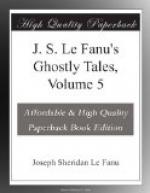Their mother had gone down to the bog, to carry up a hamper of turf on her back. It is, or was at least, a charitable custom—and if not disused, long may it continue—for the wealthier people when cutting their turf and stacking it in the bog, to make a smaller stack for the behoof of the poor, who were welcome to take from it so long as it lasted, and thus the potato pot was kept boiling, and hearth warm that would have been cold enough but for that good-natured bounty, through wintry months.
Moll Ryan trudged up the steep “bohereen” whose banks were overgrown with thorn and brambles, and stooping under her burden, re-entered her door, where her dark-haired daughter Nell met her with a welcome, and relieved her of her hamper.
Moll Ryan looked round with a sigh of relief, and drying her forehead, uttered the Munster ejaculation:
“Eiah, wisha! It’s tired I am with it, God bless it. And where’s the craythurs, Nell?”
“Playin’ out on the road, mother; didn’t ye see them and you comin’ up?”
“No; there was no one before me on the road,” she said, uneasily; “not a soul, Nell; and why didn’t ye keep an eye on them?”
“Well, they’re in the haggard, playin’ there, or round by the back o’ the house. Will I call them in?”
“Do so, good girl, in the name o’ God. The hens is comin’ home, see, and the sun was just down over Knockdoulah, an’ I comin’ up.”
So out ran tall, dark-haired Nell, and standing on the road, looked up and down it; but not a sign of her two little brothers, Con and Bill, or her little sister, Peg, could she see. She called them; but no answer came from the little haggard, fenced with straggling bushes. She listened, but the sound of their voices was missing. Over the stile, and behind the house she ran—but there all was silent and deserted.
She looked down toward the bog, as far as she could see; but they did not appear. Again she listened—but in vain. At first she had felt angry, but now a different feeling overcame her, and she grew pale. With an undefined boding she looked toward the heathy boss of Lisnavoura, now darkening into the deepest purple against the flaming sky of sunset.
Again she listened with a sinking heart, and heard nothing but the farewell twitter and whistle of the birds in the bushes around. How many stories had she listened to by the winter hearth, of children stolen by the fairies, at nightfall, in lonely places! With this fear she knew her mother was haunted.
No one in the country round gathered her little flock about her so early as this frightened widow, and no door “in the seven parishes” was barred so early.
Sufficiently fearful, as all young people in that part of the world are of such dreaded and subtle agents, Nell was even more than usually afraid of them, for her terrors were infected and redoubled by her mother’s. She was looking towards Lisnavoura in a trance of fear, and crossed herself again and again, and whispered prayer after prayer. She was interrupted by her mother’s voice on the road calling her loudly. She answered, and ran round to the front of the cabin, where she found her standing.




